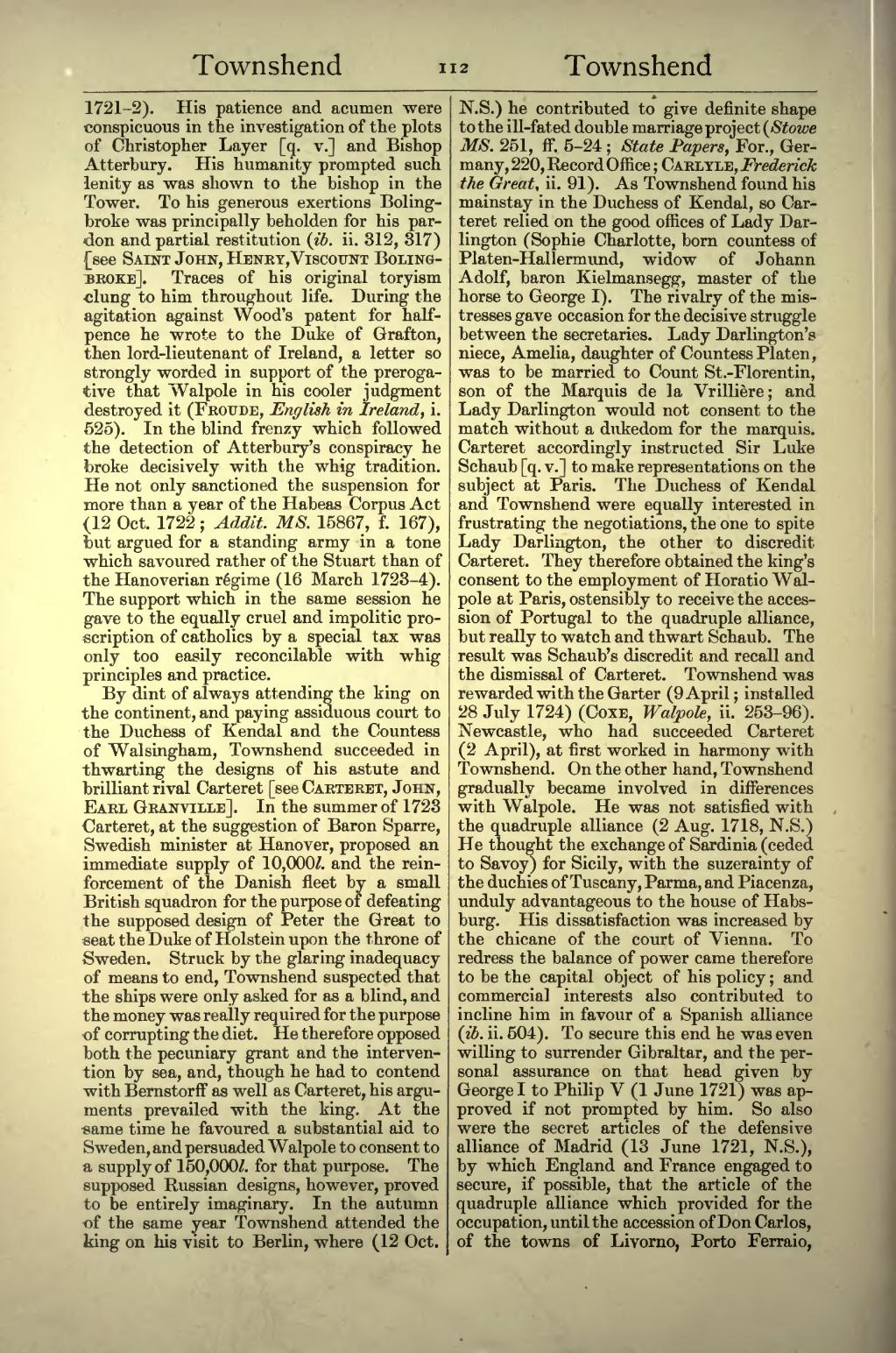1721–2). His patience and acumen were conspicuous in the investigation of the plots of Christopher Layer [q. v.] and Bishop Atterbury. His humanity prompted such lenity as was shown to the bishop in the Tower. To his generous exertions Bolingbroke was principally beholden for his pardon and partial restitution (ib. ii. 312, 317) [see Saint John, Henry, Viscount Bolingbroke]. Traces of his original toryism clung to him throughout life. During the agitation against Wood's patent for halfpence he wrote to the Duke of Grafton, then lord-lieutenant of Ireland, a letter so strongly worded in support of the prerogative that Walpole in his cooler judgment destroyed it (Froude, English in Ireland, i. 525). In the blind frenzy which followed the detection of Atterbury's conspiracy he broke decisively with the whig tradition. He not only sanctioned the suspension for more than a year of the Habeas Corpus Act (12 Oct. 1722; Addit. MS. 15867, f. 167), but argued for a standing army in a tone which savoured rather of the Stuart than of the Hanoverian régime (16 March 1723–4). The support which in the same session he gave to the equally cruel and impolitic proscription of catholics by a special tax was only too easily reconcilable with whig principles and practice.
By dint of always attending the king on the continent, and paying assiduous court to the Duchess of Kendal and the Countess of Walsingham, Townshend succeeded in thwarting the designs of his astute and brilliant rival Carteret [see Carteret, John, Earl Granville]. In the summer of 1723 Carteret, at the suggestion of Baron Sparre, Swedish minister at Hanover, proposed an immediate supply of 10,000l. and the reinforcement of the Danish fleet by a small British squadron for the purpose of defeating the supposed design of Peter the Great to seat the Duke of Holstein upon the throne of Sweden. Struck by the glaring inadequacy of means to end, Townshend suspected that the ships were only asked for as a blind, and the money was really required for the purpose of corrupting the diet. He therefore opposed both the pecuniary grant and the intervention by sea, and, though he had to contend with Bernstorff as well as Carteret, his arguments prevailed with the king. At the same time he favoured a substantial aid to Sweden, and persuaded Walpole to consent to a supply of 150,000l. for that purpose. The supposed Russian designs, however, proved to be entirely imaginary. In the autumn of the same year Townshend attended the king on his visit to Berlin, where (12 Oct. N.S.) he contributed to give definite shape to the ill-fated double marriage project (Stowe MS. 251, ff. 5–24; State Papers, For., Germany, 220, Record Office; Carlyle, Frederick the Great, ii. 91). As Townshend found his mainstay in the Duchess of Kendal, so Carteret relied on the good offices of Lady Darlington (Sophie Charlotte, born countess of Platen-Hallermund, widow of Johann Adolf, baron Kielmansegg, master of the horse to George I). The rivalry of the mistresses gave occasion for the decisive struggle between the secretaries. Lady Darlington's niece, Amelia, daughter of Countess Platen, was to be married to Count St.-Florentin, son of the Marquis de la Vrillière; and Lady Darlington would not consent to the match without a dukedom for the marquis. Carteret accordingly instructed Sir Luke Schaub [q. v.] to make representations on the subject at Paris. The Duchess of Kendal and Townshend were equally interested in frustrating the negotiations, the one to spite Lady Darlington, the other to discredit Carteret. They therefore obtained the king's consent to the employment of Horatio Walpole at Paris, ostensibly to receive the accession of Portugal to the quadruple alliance, but really to watch and thwart Schaub. The result was Schaub's discredit and recall and the dismissal of Carteret. Townshend was rewarded with the Garter (9 April; installed 28 July 1724) (Coxe, Walpole, ii. 253–96). Newcastle, who had succeeded Carteret (2 April), at first worked in harmony with Townshend. On the other hand, Townshend gradually became involved in differences with Walpole. He was not satisfied with the quadruple alliance (2 Aug. 1718, N.S.). He thought the exchange of Sardinia (ceded to Savoy) for Sicily, with the suzerainty of the duchies of Tuscany, Parma, and Piacenza, unduly advantageous to the house of Habsburg. His dissatisfaction was increased by the chicane of the court of Vienna. To redress the balance of power came therefore to be the capital object of his policy; and commercial interests also contributed to incline him in favour of a Spanish alliance (ib. ii. 504). To secure this end he was even willing to surrender Gibraltar, and the personal assurance on that head given by George I to Philip V (1 June 1721) was approved if not prompted by him. So also were the secret articles of the defensive alliance of Madrid (13 June 1721, N.S.), by which England and France engaged to secure, if possible, that the article of the quadruple alliance which provided for the occupation, until the accession of Don Carlos, of the towns of Livorno, Porto Ferraio,
